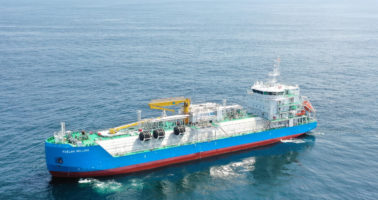By 2023, the global LNG bunkering fleet will be five times larger than in 2018, reaching 50 vessels, supporting the uptake of LNG as fuel by international shipping.
One of the latest additions to the fleet will be the FueLNG Bellina, a 7,500 m3 capacity LNG bunker for Singapore, the first in the country. The FueLNG Bellina is owned by FueLNG, a joint venture between Keppel Offshore & Marine Ltd and Shell Eastern Petroleum (Pte) Ltd. Expected to be operational by the end of the year, FueLNG Bellina will be the first vessel to provide regular sourcing services for Ship-to-ship LNG within the Port of Singapore. FueLNG will also provide LNG sourcing from Singapore's first LNG fueling facility, to be built by Keppel O&M at its Floating Living Lab (FLL), with Shell supplying the LNG to the 3,500 m3 capacity facility when it goes online. the fourth quarter of 2021.
Designed by Keppel O&M and built by Keppel Nantong Shipyard in China, FueLNG Bellina will be highly maneuverable, facilitated by two azimuthal stern thrusters and a bow thruster. The ship's thrusters will enable "crab maneuvers" during supply operations, minimizing the use of tugboats and, in turn, reducing fuel consumption and emissions.
With a filling rate of between 100 and 1,000 m3 of LNG per hour, the LNG tanker will be able to refuel various types of ships at heights ranging from 3 m to 23 m above water level. This is essential to be able to supply a wide range of LNG ships in one of the busiest supply centers in the world.
With dual fuel propulsion, FueLNG Bellina will also use boiling gas (BOG) as fuel for power generation and propulsion, reducing CO2, particulate and NOx emissions.
The first LNG smart bunker ship
Adding to its credentials, FueLNG Bellina will be the first “smart” LNG bunkering vessel, equipped with a digital platform to monitor and execute the entire bunkering process. Keppel O&M reported that the Singapore flagged vessel FueLNG Bellina is the world's first bunkering vessel with Smart Notation; is equipped with Keppel O&M's proprietary VesselCare solutions, a remote vessel monitoring and analysis platform for condition-based maintenance and real-time support of vessel operations.
"This occasion marks an important milestone on Singapore's path to achieving the IMO greenhouse gas emissions target by 2030. It is our next step towards regular ship-to-ship LNG bunkering activities in Singapore. As we move towards a low-carbon future, we will intensify our efforts to develop the Port of Singapore into a global LNG bunkering hub.”
Chee Hong Tat, Singapore's Chief Minister of State, the Ministry of Transport and the Ministry of Foreign Affairs,
"Building Singapore's first LNG bunkering vessel and having a dedicated bunkering facility demonstrates our commitment to global customers that LNG as a marine fuel will be readily available in Singapore."
Chris Ong, CEO of Keppel O&M and the president of FueLNG.
With the FueLNG Bellina and the dedicated fueling facility at the FLL at the Keppel O&M shipyard, FueLNG will be able to provide ship-to-ship fueling for container ships, tankers or other large vessels that run on LNG, as well as for smaller vessels such as tugs and other port vessels.
FueLNG Bellina supports initiatives launched by the Singapore Maritime and Port Authority (MPA) to increase the adoption of LNG as a marine fuel, facilitating Singapore's growth as a global LNG supply hub.
When operational, the ship's first contracts will be to supply ship-to-ship LNG supplies to Shell-chartered tankers and to one of Hapag Lloyd's container ships.
Hapag Lloyd senior director of global fuel purchasing Jan Christensen said: "We are looking to reduce our carbon emissions and LNG propulsion on our vessels is one of the main contributors. Singapore is a major port of call and we are pleased that "There is the necessary infrastructure provided by FueLNG so that we can fuel our LNG-powered vessels."
FueLNG director and Shell head of LNG, Tahir Faruqui, said: "Singapore is an important country for Shell and will be a key region of the world for our LNG business. LNG will play a critical role in the path to renewable fuels. zero emissions as zero and low carbon fuels are developed. It is the cleanest fuel currently available to the shipping sector in significant volumes.

